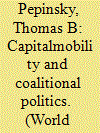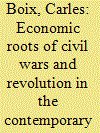|
|
|
Sort Order |
|
|
|
Items / Page
|
|
|
|
|
|
|
| Srl | Item |
| 1 |
ID:
083117


|
|
|
|
|
| Publication |
2008.
|
| Summary/Abstract |
This article investigates the coalitional bases of authoritarian rule to explain striking variation in adjustment policy to the Asian Financial Crisis in Indonesia and Malaysia. Given currency depreciation with financial sector fragility, holders of mobile assets prefer to maintain an open capital account, while owners of fixed assets and labor favor restrictions of capital mobility to facilitate expansionary macroeconomic policies. Differences in adjustment policy across the two countries reflect differences in the political coalitions supporting the authoritarian regimes. These findings illuminate the nature of political conflict during financial crises and show how a nuanced view of the coalitions supporting authoritarian rule can yield powerful insights into the political economy of authoritarianism and economic adjustment in a global economy.
|
|
|
|
|
|
|
|
|
|
|
|
|
|
|
|
| 2 |
ID:
083116


|
|
|
|
|
| Publication |
2008.
|
| Summary/Abstract |
To explain the distribution of civil wars, guerrilla warfare, and revolutionary outbreaks, the literature on modern political violence has shifted, broadly speaking, from a modernization perspective that emphasized the role of material conflict and of grievances to a more recent research program that stresses the geographical and organizational opportunities that insurgents may have to engage in violence. Drawing on those lines of inquiry equally, this article offers an integrated analytical model that considers both the motives and the opportunities of states and rebels. Civil wars, guerrillas, and revolutionary outbreaks are seen as a result of the nature and distribution of wealth in each country. Systematic and organized violent conflicts are most likely in economies where inequality is high and wealth is mostly immobile, that is, in societies where those worse off would benefit substantially from expropriating all assets. Violence is conditional on the mobilizational and organizational capacity of challengers and on the state capacity to control its territory. The theory is tested on data on civil wars from 1850 to 1999 for the whole world and on data on guerrilla warfare and revolutionary episodes spanning the years from 1919 to 1997 across all countries.
|
|
|
|
|
|
|
|
|
|
|
|
|
|
|
|
| 3 |
ID:
083115


|
|
|
|
|
| Publication |
2008.
|
| Summary/Abstract |
The author argues that to understand the relationship between partisan government and equality two fundamental things need to be done: separate the effects of partisanship on policy and of policy on the economy; and assess the influence of government partisanship once the mediating role of corporatism is accounted for. The main goal of this article is to explore the relationship between government partisanship, policy, and inequality at the lower half of the wage distribution. The analysis is motivated by a puzzling finding in previous work: the absence of government partisanship effects on earnings inequality. The author focuses on the role of three different policies: government employment, the generosity of the welfare state, and minimum wages. The results show that government employment is a most significant determinant of inequality (although it is affected by left government only when corporatism is low). They also demonstrate that welfare state generosity does not affect inequality and, in turn, is not associated with left government. Finally, they reveal that the effect of government partisanship on minimum wages and of minimum wages on inequality is completely conditional on the levels of corporatism (these effects are only present when corporatism is low). The author explains why specific policies do or do not affect earnings inequality and also why corporatism mitigates or magnifies the influence of government partisanship. By explicitly exploring the determinants of policy and earnings inequality, the article represents an important contribution to our understanding of how governments can promote redistribution
|
|
|
|
|
|
|
|
|
|
|
|
|
|
|
|
| 4 |
ID:
083118


|
|
|
|
|
| Publication |
2008.
|
| Summary/Abstract |
Latin America had long been the one region in the world without major ethnic parties, but in recent years a couple of inclusive ethnic parties have registered important electoral victories. A substantial literature maintains that ethnic parties win by mobilizing their base through exclusionary ethnic appeals, but this article argues that such appeals are unlikely to be successful in regions such as Latin America where ethnic polarization is low and ethnic identification is fluid and multiple. In these areas, inclusive strategies are more likely to be successful. Indeed, some parties, which the author refers to as ethnopopulist parties, have won votes from diverse ethnic constituencies by moderating their discourse, forming cross-ethnic alliances, and formulating a broad populist appeal. This article focuses on the most successful ethnopopulist party to date, the Movimiento al Socialismo (mas) in Bolivia. It shows how the mas used an inclusive ethnic appeal and classical populist strategies to fuse traditional populist constituencies-politically disenchanted urban mestizos with nationalist and statist views-to its rural, largely indigenous base. The article also examines the extent to which these arguments can account for the varying performance of other parties in the region.
|
|
|
|
|
|
|
|
|
|
|
|
|
|
|
|
|
|
|
|
|